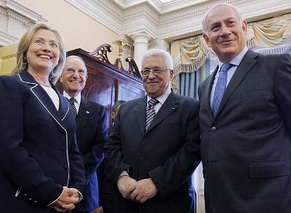|
World Jewish News

Hillary Clinton welcoming Benjamin Netanyahu, Mahmoud Abbas, and George Mitchell, in Washington, September 2, 2010. Photo by: AP
|
Palestinian, Israeli officials meet in N.Y. amid settlement freeze row
22.09.2010, Israel and the World Representatives of Israel, the United States and the Palestinian Authority met in New York on Tuesday in a last-ditch effort to end the impasse over construction in the settlements that jeopardizes the future of the direct talks between Israel and the Palestinians. The parties appeared to have reached a dead end over the past two days, and the atmosphere ahead of the tripartite meeting was very tense.
Israel Defense Forces Chief of Staff Gabi Ashkenazi told the Knesset Foreign Affairs and Defense Committee on Tuesday that if the talks run aground it could ignite violence in the West Bank. He stressed, however, that there is no expectation of a reprise of the second intifada that began in late September of 2000 after the collapse of the Camp David talks.
According to IDF assessments, any disturbances would likely involve mainly demonstrations and clashes with soldiers, rather than terror attacks against civilians.
Both sides are entrenched in their positions on the construction freeze. Prime Minister Benjamin Netanyahu is determined not to extend the 10-month suspension of building in Jewish settlements on the West Bank beyond Sunday, when it is due to expire. Palestinian Authority President Mahmoud Abbas, meanwhile, says the Palestinians will quit talks if construction resumes.
The parties had hoped to reach a compromise Tuesday that would at least allow a meeting between Netanyahu and Abbas early next week, possibly in the United States. Netanyahu's envoy in the peace process, Isaac Molho, and negotiator Daniel Taub from the Foreign Ministry represented Israel at the meeting. Saeb Erekat, who heads the Palestinian negotiating team, represented the PA. Special U.S. Middle East envoy George Mitchell and Washington officials also attended.
Three formulas for ending the impasse have been proposed, but none is acceptable to both Israel and the Palestinians. The first, proposed by the Palestinians, would extend the freeze for three months, during which the negotiators would hold intensive talks on the issues of borders and security. The idea is that once the border issue is hammered out a decision can be made on where construction can continue and where it cannot. Israel rejects this proposal.
It is suggesting that the freeze not be extended, officially. Instead, Israel would in fact limit construction, permitting building to resume mainly in the large settlement blocs and only to accommodate natural increase. The Palestinians oppose this idea.
The third proposal comes from the Egyptians. It envisions no official extension of the freeze, with no public announcement from Israel on the matter, and a promise from Netanyahu of a "silent freeze" of several more months. Israel has given this the thumbs-down.
According to an anonymous Israeli source who is close to the negotiations, "the sense in the U.S. administration is that the talks may crash in the coming days."
Also yesterday, a meeting of donor states to the PA ended abruptly over a disagreement between PA Prime Minister Salam Fayyad and Israeli Deputy Foreign Minister Danny Ayalon.
Ayalon said Fayyad refused to accept a declaration using the formula "two states for two peoples," agreeing only to the original wording of "two states." The press conference scheduled to take place after the meeting was also canceled.
The joint declaration of the conference was also expected to include for the first time a clear call for an end to the flotilla initiatives to the Gaza Strip.
Haaretz.com
|
|
